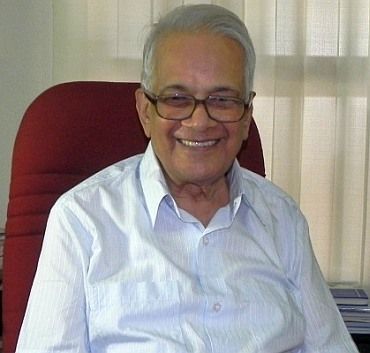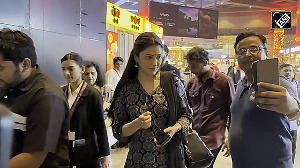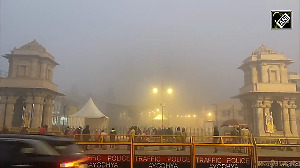'If you are a professional journalist, don't ever think that your work is going to bring in revolution or that you are going to change the world. That job is best left to the revolutionaries,' M V Kamath, the legendary journalist who passed away on October 9, told Nitin Gokhale.
 Sometime in 1984, in Guwahati, I was still undecided about continuing in journalism after having joined The Sentinel in May 1983.
Sometime in 1984, in Guwahati, I was still undecided about continuing in journalism after having joined The Sentinel in May 1983.
The mind was torn between giving another shot at the CDS (Combined Defence Services) exam after having lost a chance to join the Indian Air Force because my graduation results got delayed and continuing with the exciting but poorly paid profession of journalism, I ran into a gentle, pleasant man with impeccable manners in Guwahati's only decent Hotel, Belle Vue in early 1984.
M V Kamath was already a legend among journalists, having spent more than three decades in the capitals of the world -- Brussels, Washington, London -- and having edited The Illustrated Weekly, India's most famous magazine. He had come to visit the North-East after a four, five year gap. People remembered him for a cover story in the Weekly in the late 1970s describing the region as 'Seven Sisters.'
One evening, the then Editor of The Sentinel, D N Bezboruah, a friend of Mr Kamath, sent me on an errand -- I was too junior to have interviewed him -- to Mr Kamath's hotel. As I entered his room and introduced myself, his first question was: "What is a Gokhale doing in Assam?"
As I narrated my short story, father-in-the-army-posted-in-Guwahati-therefore-I am-here, etc, he ordered a coffee, made me sit down and relax and started chatting about life in Guwahati.
As I opened up and told him, how I had walked into The Sentinel one afternoon for a casual interview and had started working that very evening, he remarked: "That's a great accident."
His relaxed personality encouraged me to ask him a question that I would normally hesitate to ask a towering personality at the first meeting.
I blurted out: "Sir, how do you sustain yourself in this uncertain, poorly paid and rarely understood profession?" His eyes twinkled, had a gentle, amused smile on his lips as he contemplated a reply to my seemingly silly question. As he took his time, I thought to myself, have I been impertinent?
The very next moment, Mr Kamath put me out of my misery. He said: "Son, when I started with the Free Press Journal in the 1950s, my guru and a legend in journalism, (S) Sadanand had put me at ease after I had similar doubts. You know what he told me? He said as long as you do serious work but don't take yourself too seriously, as long as you realise that you are as good as your last byline and as long as you are discreet, you can be a reasonably successful journalist."
Then Mr Kamath went on elaborate the three mantras: If you are a professional journalist, don't ever think that your work is going to bring in revolution or that you are going to change the world. That job is best left to the revolutionaries (don't take yourself seriously).
As a journalist you have to perform consistently. One flash in the pan, one impact creating story is of no use to those who want to remain engaged with journalism on a long term basis; so never rest on your laurels (You are as good as your last byline).
Discretion, moderation is the key to successful human interaction. In journalism it is all the more important. People will trust you if you keep your word, keep their confidence. (It is more important what you don't write than what you write!)
"I have followed these principles to the 'T' and I haven't done badly," Mr Kamath said, smiling mischievously. That was surely an understatement. We chatted some more. I came back and within a month or so I decided to continue with journalism much to my parents' dismay (that story is here).
If I have managed to keep my head above water for the past 31 years, it is simply because I have tried to follow the three principles that Mr Kamath so effortlessly conveyed to me when I was barely 22.
Mr Kamath's influence on my life and profession continued thereafter as I made it a point every time I went to Pune to stop over at Khar in Bombay where he invariably cooked breakfast or made a cup of coffee and chatted about life, journalism and writing, sitting amidst his vast collection of books. He couldn't make it for my marriage, but took a instant liking to my wife Neha, when we visited him on our way to Goa in 1988.
"It's time to switch priorities, Nitin," he told me as friendly advice; "now journalism has to come second."
Our contact became infrequent after he shifted to Manipal, but I would call occasionally and he would invariably enquire about our growing family, my growth in journalism and continue to be a calming influence.
His life and work is too well know for me to recount the stellar contribution he made to journalism, but one habit of his has had a lasting impact on me.
Mr Kamath used to write at least 1,000 words every day on his old, battered but beloved Olivetti typewriter, no matter how busy he was. He continued to do so until his last days. The love for writing and the discipline to do it every single day kept him busy even in his 80s and early 90s.
If I can bring even an iota of his discipline and stamina in my life, I would be more than happy.
Unfortunately they don't make the likes of M V Kamath anymore. We will miss you, but wherever you have gone, you are bound to make people happy.
Nitin Gokhale, Strategic Affairs Editor, NDTV, is one of India's best-known journalists.
Also read: Mr Kamath on the Quit India Movement











 © 2025 Rediff.com -
© 2025 Rediff.com -